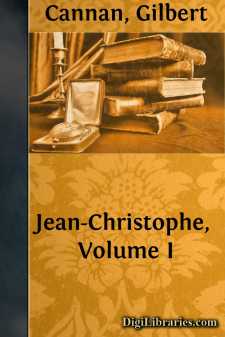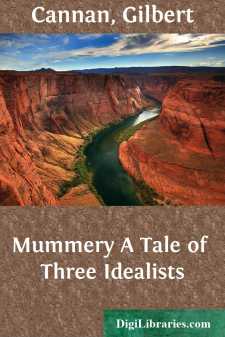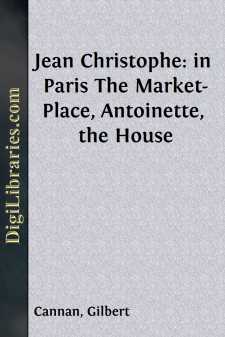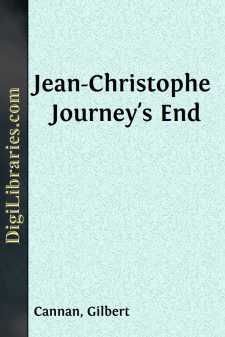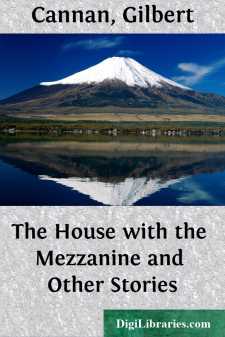Categories
- Antiques & Collectibles 13
- Architecture 36
- Art 48
- Bibles 22
- Biography & Autobiography 813
- Body, Mind & Spirit 142
- Business & Economics 28
- Children's Books 15
- Children's Fiction 12
- Computers 4
- Cooking 94
- Crafts & Hobbies 4
- Drama 346
- Education 46
- Family & Relationships 57
- Fiction 11828
- Games 19
- Gardening 17
- Health & Fitness 34
- History 1377
- House & Home 1
- Humor 147
- Juvenile Fiction 1873
- Juvenile Nonfiction 202
- Language Arts & Disciplines 88
- Law 16
- Literary Collections 686
- Literary Criticism 179
- Mathematics 13
- Medical 41
- Music 40
- Nature 179
- Non-Classifiable 1768
- Performing Arts 7
- Periodicals 1453
- Philosophy 64
- Photography 2
- Poetry 896
- Political Science 203
- Psychology 42
- Reference 154
- Religion 513
- Science 126
- Self-Help 84
- Social Science 81
- Sports & Recreation 34
- Study Aids 3
- Technology & Engineering 59
- Transportation 23
- Travel 463
- True Crime 29
Jean-Christophe, Volume I
by: Gilbert Cannan
Description:
Excerpt
PREFACE
"Jean-Christophe" is the history of the development of a musician of genius. The present volume comprises the first four volumes of the original French, viz.: "L'Aube," "Le Matin," "L'Adolescent," and "La Révólte," which are designated in the translation as Part I—The Dawn; Part II—Morning; Part III—Youth; Part IV—Revolt. Parts I and II carry Jean-Christophe from the moment of his birth to the day when, after his first encounter with Woman, at the age of fifteen, he falls back upon a Puritan creed. Parts III and IV describe the succeeding five years of his life, when, at the age of twenty, his sincerity, integrity, and unswerving honesty have made existence impossible for him in the little Rhine town of his birth. An act of open revolt against German militarism compels him to cross the frontier and take refuge in Paris, and the remainder of this vast book is devoted to the adventures of Jean-Christophe in France.
His creator has said that he has always conceived and thought of the life of his hero and of the book as a river. So far as the book has a plan, that is its plan. It has no literary artifice, no "plot." The words of it hang together in defiance of syntax, just as the thoughts of it follow one on the other in defiance of every system of philosophy. Every phase of the book is pregnant with the next phase. It is as direct and simple as life itself, for life is simple when the truth of it is known, as it was known instinctively by Jean-Christophe. The river is explored as though it were absolutely uncharted. Nothing that has ever been said or thought of life is accepted without being brought to the test of Jean-Christophe's own life. What is not true for him does not exist; and, as there are very few of the processes of human growth or decay which are not analysed, there is disclosed to the reader the most comprehensive survey of modern life which has appeared in literature in this century.
To leave M. Rolland's simile of the river, and to take another, the book has seemed to me like a, mighty bridge leading from the world of ideas of the nineteenth century to the world of ideas of the twentieth. The whole thought of the nineteenth century seems to be gathered together to make the starting-point for Jean-Christophe's leap into the future. All that was most religious in that thought seems to be concentrated in Jean-Christophe, and when the history of the book is traced, it appears that M. Rolland has it by direct inheritance.
M. Rolland was born in 1866 at Clamecy, in the center of France, of a French family of pure descent, and educated in Paris and Rome. At Rome, in 1890, he met Malwida von Meysenburg, a German lady who had taken refuge in England after the Revolution of 1848, and there knew Kossuth, Mazzini, Herzen, Ledin, Rollin, and Louis Blanc. Later, in Italy, she counted among her friends Wagner, Liszt, Lenbach, Nietzsche, Garibaldi, and Ibsen. She died in 1908. Rolland came to her impregnated with Tolstoyan ideas, and with her wide knowledge of men and movements she helped him to discover his own ideas....


